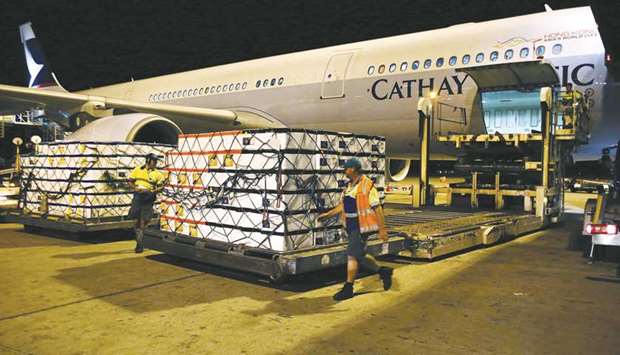Fears
of further damage to world trade are seen with global air cargo demand
falling 3.4% in May from a year earlier, caused by the ongoing US-China
trade war.
Weak global trade volumes and tensions between
governments have contributed to a decline in new export orders and
dented the air freight segment.
Goods valued at $6tn are exported by aircraft each year, according to IATA, accounting for 35% of the value of world trade.
Air
freight companies have already seen a revenue fall due to declining
shipments of high-tech goods such as semiconductor chips and products
used in ‘just-in-time manufacturing’.
The world’s top two economies
have been locked in a trade war since last year, swapping tit-for-tat
tariff on goods worth hundreds of billions of dollars, sending markets
into a tailspin.
The fallout has gone far beyond their shores, with manufacturing in many export-dependent Asian economies taking a hit.
Undoubtedly, the trade war will have consequences on both the United States and China, the world’s two largest economies.
But collectively, they can bring the global economy crashing down.
Demand
has suffered due to very weak global trade volumes and US-China
tensions, which has contributed to a decline in new export orders, data
provided by the International Air Transport Association show.
China’s
trade volumes may contract between June and August this year as ongoing
trade disputes weigh down ocean trade imports and air exports, a report
showed.
The trade war has had a huge impact on supply and demand
within the US truckload market. Companies scrambling to beat the
deadline of the proposed tariff increases on Chinese-made goods pushed
major ocean container volumes into the ports, and left US warehouses
packed full of imported goods that were not meant to ship until after
Chinese New Year in 2019.
As inventories grew, many US importers
reportedly ran out of available warehouse space, so they were left
looking for options close-by US ocean ports to temporarily store their
cargo while they waited for the 2019 retail season to kick off.
All
this happened simultaneously with what was already set to be a record
year in peak season volumes as US retailers prepared to meet
holiday-driven demand.
So, the impact on the truckload market was
described as “immediate”, and truckload carriers were quick to respond
by repositioning themselves to major US port markets where volumes have
remained elevated ever since.
Meanwhile, freight operators seemed to
be bracing for more disruption as tensions between Washington and
Beijing ratchet up, and trade experts warn that declining shipments —
worsened by Brexit jitters and simmering tensions in the Middle East —
indicate a slowdown in global growth.
Data from the International Air
Transport Association shows that demand — measured in freight tonne
kilometers (FTKs) — fell by 3.4% year-on-year, a slender improvement on
the 5.6% decrease felt in April.
IATA anticipates this sector will be
flat this year with cargo volumes of 63.1mn tonnes (63.3mn tonnes in
2018) because of the impact of higher tariffs on trade. Cargo yields are
expected to be flat in 2019 after a 12.3% improvement in 2018, explains
IATA, as cargo load factors fall further, and supply-demand conditions
weaken.
Despite the slight progress, IATA director-general and CEO
Alexandre de Juniac said trade tensions around the world will continue
to affect air cargo unless something changes.
“The impact of the
US-China trade war on air freight volumes in May was clear. Year-on-year
demand fell by 3.4%. It’s evidence of the economic damage that is done
when barriers to trade are erected.
“Renewed efforts to ease the
trade tensions coming on the sidelines of the G20 meeting are welcome,
but even if those efforts are successful in the short-term, restoring
business confidence and growing trade will take time. And we can expect
the tough business environment for air cargo to continue.”
Already,
the global trade body of airlines issued a warning that the effects of
the US-China trade war and high fuel prices will wipe $7.5bn off
expected airline profits in 2019.
Carriers worldwide will
collectively generate a profit of $28bn, down a fifth on estimates made
at the end of last year, according to the International Air Transport
Association forecast, $2bn less than in 2018.
Brian Pearce, chief
economist at the IATA, forecast “zero growth at best” for air cargo
traffic this year, noting the impact of the trade tariffs imposed in the
first half of 2018.
The Asia-Pacific region, which accounts for around 40% of global air cargo traffic, was “clearly under pressure”, he noted.
“Cargo
is such an important feature that the weakness in trade and the risk
surrounding it will mean profitability will be weaker in this region,”
Pearce added.
* Pratap John is Business Editor at Gulf Times.

Polystyrene boxes sit on a hydraulic lift to be loaded into the cargo hold of a Cathay Pacific Airways aircraft. Weak global trade volumes and tensions between governments have contributed to a decline in new export orders and dented the air freight segment.

